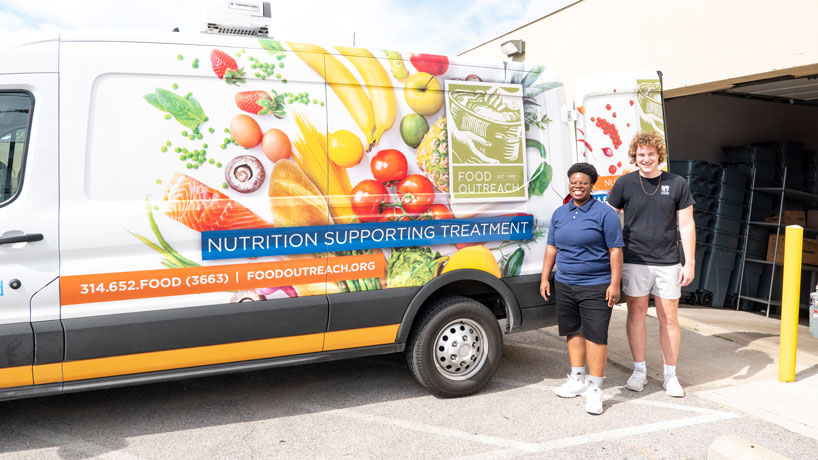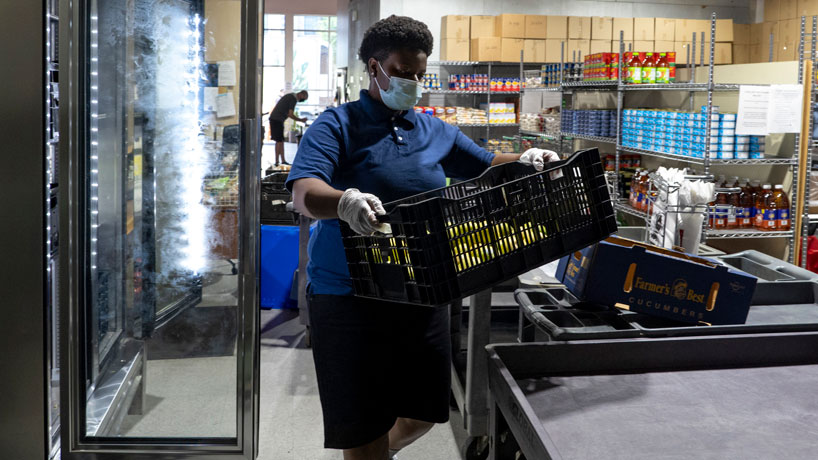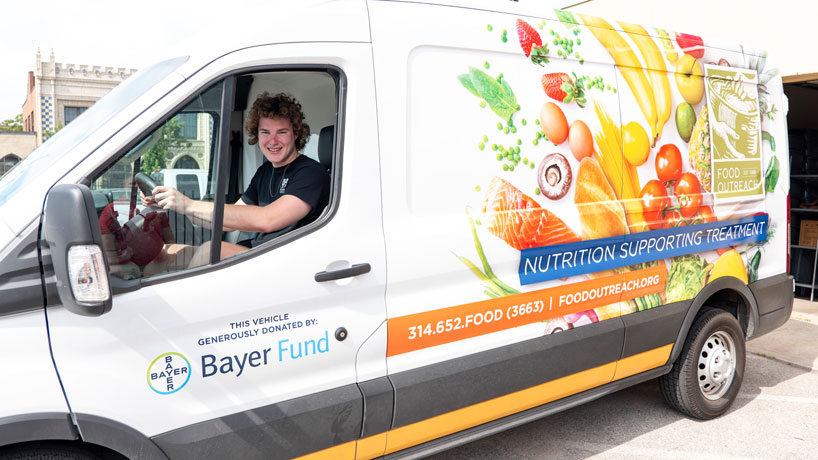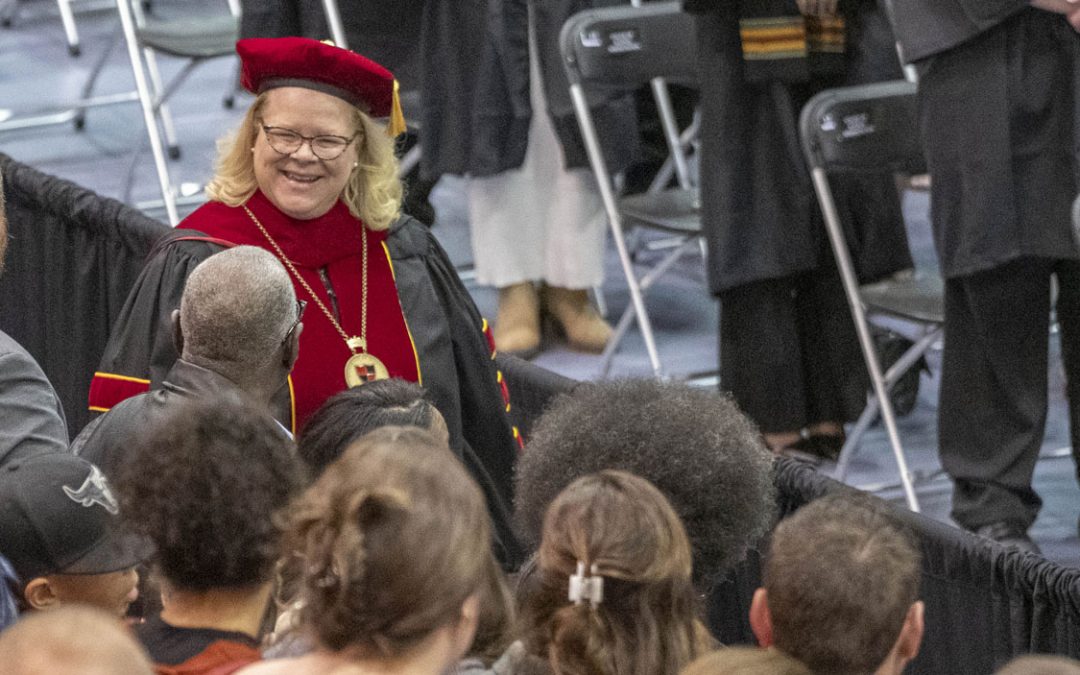
Leizel Thomas and Noah Young are both UMSL students and Food Outreach employees. (Photos by August Jennewein)
Two current students at the University of Missouri–St. Louis are playing pivotal roles in addressing food insecurity for those living with chronic illnesses in the St. Louis area.
Leizel Thomas, who is studying organizational leadership, and Noah Young, who is studying business administration, both work at Food Outreach, a St. Louis-based organization that provides comprehensive nutritional services to people living with HIV and cancer. A pilot program for veterans with diabetes is also underway.
Thomas, a full-time employee since November 2019, serves as Nutrition Center coordinator and assistant chef, while Young, a part-time employee since February 2021, is Food Outreach’s lead van driver.
Despite serving 1,800 clients across 160 zip codes in Missouri and Illinois, Food Outreach has a staff of just 14 employees, plus about 800 volunteers. Director of Client Services Kathy Spencer says this means every employee must wear a lot of hats, and that’s certainly true of both Thomas and Young.
“They’re able to be very flexible and step into anything that they’re assigned,” she said. “They’re both very intelligent, completely trustworthy and able to make decisions on their feet. They’re both very friendly and engaging with clients. I think they both have a passion for our mission. They believe in what we’re doing, and they know that they’re an integral part of what we’re doing.”
While Thomas and Young work in different capacities at Food Outreach, they both serve in very client-facing roles that allow them to interact directly with the people that the organization serves.
Thomas primarily works in Food Outreach’s Nutrition Center, which offers groceries and from-scratch meals (think glazed salmon, turkey chili and roasted Brussels sprouts) that are tailored to each client’s specific needs. Every two weeks, clients stop by the Nutrition Center to fill out a new grocery menu, and Thomas greets them and assists with their order. Taking into account client preferences, inventory, food costs and availability, she orders all of the product – an especially challenging task given the supply chain issues brought on by COVID-19.
“She’s a wonderful individual,” Spencer said. “She’s got a great sense of humor. She’s a very hard worker. She’s reliable, 100% dependable and she interacts with the clients in a great way. I’ve worked here a very long time and she’s just one of those gems that we’re lucky enough to find and hope that she’ll stay forever.”
Leizel Thomas primarily works in Food Outreach’s Nutrition Center, which she likens to a grocery store for clients.
In addition to her work in the Nutrition Center, Thomas also works with Food Outreach Executive Chef Mike Polcyn to mass-produce meals for clients at weekly Cook & Pack events. Every other weekend, Thomas oversees a group of volunteers to cook Polcyn’s menu – which might include a roasted vegetable, fish entrée, chicken entrée and some type of chili or soup – and pack those dishes up for clients. At the end of the day, it’s those clients who keep her grounded in her work.
“The clients are all extremely grateful for the work we do and the services we provide,” Thomas said. “This job is so fulfilling because you know that you’re helping someone in the long run, and that’s really all I ever want to do – just extend a hand when I can, and I’m now doing that with my role here.”
Thomas has been a full-time student at UMSL the entire time she’s worked at Food Outreach and has found that what she’s learning in her organizational leadership classes has translated directly into her first job in an office setting. And while she wasn’t necessarily comfortable being in an authoritative role or giving direction when she first started, her work with the organization has helped her grow into a confident leader.
“When I started the program, I was working here and I was able to take my assignments and apply them to everyday work,” she said. “In the organizational leadership program, you learn a lot of skills that anyone in any workplace would need – how to talk to people or how to conduct yourself in a meeting. You would think they’re skills that people have, but you’d be really surprised. A lot of people want to be the boss but don’t want to be accountable or don’t practice proper communication. I really think that the organizational leadership program sets anyone up for success in the workplace regardless of what your discipline is.”
While Thomas assists with ordering and meal preparation on the front end of the process, Young rounds out the experience by delivering meals to Food Outreach clients who are homebound due to illness, mobility or transportation barriers that prevent them from traveling to the organization themselves. As lead van driver, a role he was promoted to in January of this year, he prepares route sheets and oversees a small team of drivers. In addition to delivering meals and groceries, the drivers also interact with clients, conduct wellness checks and relay any special requests back to the dietician.
“He plays a key role there because he’s constantly doing wellness checks and making sure that everyone that he’s delivering to is okay,” Spencer said. “He’s very reliable, dependable and is also very good with the clients.”
Over the course of his time with Food Outreach, Young has helped the organization navigate through some major changes to its home delivery program. Prior to COVID-19, about 40 clients were signed up for home delivery; now, that number is closer to 400. Of course, Young and the other drivers were also not allowed to step inside the homes of those clients during the height of the pandemic, simply leaving their meals at the front door. Now, he enjoys being able to interact with clients face to face again.
“They all enjoy having someone to talk to for a couple minutes because a lot of them are homebound, so they’re not going anywhere because they’re so sick,” he said. “It’s a unique opportunity that a lot of jobs don’t give you. I’m helping people every day. Seeing the difference I make in people’s lives and seeing how happy it makes them to get their food is very rewarding. I make a difference in people’s lives who need it the most.”
















